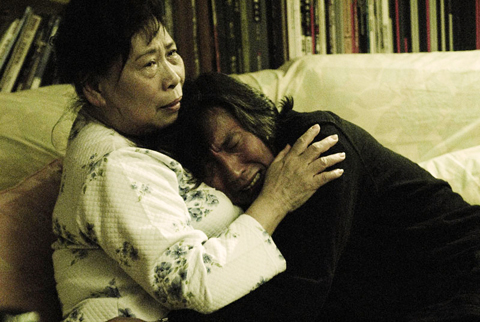A disciple of Taiwanese New Wave cinema and a sought-after director of television soap operas, Niu Chen-zer (鈕承澤) felt the urge to direct his debut feature film when approaching 40.
The result is What On Earth Have I Done Wrong?! (情非得已之生存之道), a film about making a film that won the Fipresci prize at last year’s Golden Horse Awards (金馬獎) for Chinese-language films and the Netpac award at International Film Festival Rotterdam this year.
The movie opens with Niu becoming inspired to make a mockumentary that satirizes local politicians. After securing a government subsidy to produce the film, the aspiring director assembles a production crew and a savvy producer to track down the extra money needed to complete the movie.

PHOTO COURTESY OF HONTO PRODUCTION
Like many filmmakers in Taiwan, Niu quickly finds out that scraping together enough cash is a mission impossible. Impetuous and frustrated, Niu gambles some of the government money on the stock market in the hope of winning big, courts gangsters, splurges on drugs, booze and prostitutes and pimps out his actresses to keep potential investors happy.
Meanwhile, Niu’s love life with actress Ning Ning (played by Chang Chun-ning (張鈞甯)) spins out of control because of his adultery and lying. The film gets off the ground but is diverted from its original course to become a wild self-portrait of the director.
With a deliberately low-budget, hand-held documentary look, the film offers voyeuristic pleasure by probing the grimier aspects of filmmaking and presenting the bold self-confession of Niu as a filmmaker who is willing to resort to any means to attain his goal.

PHOTO COURTESY OF HONTO PRODUCTION
The movie’s attraction lies in its guileful fusion of the fictional and the real. The illusion of documentary is maintained by interviews with such public figures as Chinese Nationalist Party (KMT) Legislator Chiu Yi (邱毅), shots of the fugitive former Rebar Group chairman Wang You-theng (王又曾) before he fled the country, as well as deadpan supporting cast members playing themselves.
Niu’s ability to laugh at himself infuses the film with plenty of funny moments. Just when members of the audience feel settled down to see the work as a self-portrait of a director charmingly grumbling over his trade and the moral predicaments he faces, the film takes a melodramatic turn, which shan’t be divulged here.
Though this exercise in self-reflexivity is prone to self-indulgence, with a sharp script, natural acting abilities of its cast and the actor-turned-director’s own charisma, What on Earth Have I Done Wrong?! is an enjoyable cinematic outing.

The Democratic Progressive Party (DPP), Chinese Nationalist Party (KMT), and the country’s other political groups dare not offend religious groups, says Chen Lih-ming (陳立民), founder of the Taiwan Anti-Religion Alliance (台灣反宗教者聯盟). “It’s the same in other democracies, of course, but because political struggles in Taiwan are extraordinarily fierce, you’ll see candidates visiting several temples each day ahead of elections. That adds impetus to religion here,” says the retired college lecturer. In Japan’s most recent election, the Liberal Democratic Party lost many votes because of its ties to the Unification Church (“the Moonies”). Chen contrasts the progress made by anti-religion movements in

Taiwan doesn’t have a lot of railways, but its network has plenty of history. The government-owned entity that last year became the Taiwan Railway Corp (TRC) has been operating trains since 1891. During the 1895-1945 period of Japanese rule, the colonial government made huge investments in rail infrastructure. The northern port city of Keelung was connected to Kaohsiung in the south. New lines appeared in Pingtung, Yilan and the Hualien-Taitung region. Railway enthusiasts exploring Taiwan will find plenty to amuse themselves. Taipei will soon gain its second rail-themed museum. Elsewhere there’s a number of endearing branch lines and rolling-stock collections, some

Last week the State Department made several small changes to its Web information on Taiwan. First, it removed a statement saying that the US “does not support Taiwan independence.” The current statement now reads: “We oppose any unilateral changes to the status quo from either side. We expect cross-strait differences to be resolved by peaceful means, free from coercion, in a manner acceptable to the people on both sides of the Strait.” In 2022 the administration of Joe Biden also removed that verbiage, but after a month of pressure from the People’s Republic of China (PRC), reinstated it. The American

Chinese Nationalist Party (KMT) legislative caucus convener Fu Kun-chi (傅?萁) and some in the deep blue camp seem determined to ensure many of the recall campaigns against their lawmakers succeed. Widely known as the “King of Hualien,” Fu also appears to have become the king of the KMT. In theory, Legislative Speaker Han Kuo-yu (韓國瑜) outranks him, but Han is supposed to be even-handed in negotiations between party caucuses — the Democratic Progressive Party (DPP) says he is not — and Fu has been outright ignoring Han. Party Chairman Eric Chu (朱立倫) isn’t taking the lead on anything while Fu